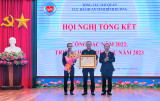OCOP and rural tourism
The advantage of Binh Duong when implementing the One Commune One Product (OCOP) program is that most of the key products have been promoted by localities to register potential products for the program, focusing on 6 main product groups of food, beverages, medicinal herbs, fabrics and garments, decoration, furniture, souvenirs, community tourism services and tourist attractions. For the group of products of growing, preserving and processing agricultural, forestry and fishery products, the focus is mainly on some typical products such as green-skin pomelo, orange leaf sugar pomelo, pomelo wine, earthen oranges, bananas, mangosteen, orchids, lacquer, ceramics, carvings and sculptures. Currently, 47 products have obtained provincial OCOP certification; in which, 8 are with 4 stars, the rest with 3 stars. After being recognized, OCOP has facilitated better consumption of products and increased income of farmers and businesses.
Besides the positive aspects that have been achieved, challenges remain. The number of OCOP has increased rapidly, but it is not really sustainable as there is a lack of initiative of participants, and there is no focus on solutions for standardizing quality, product packaging design, and promotion activities while trade is still fragmented and inconsistent.
At the seminar on solutions to develop OCOP and rural tourism in promoting agricultural economy and building new rural areas organized by the Ministry of Agriculture and Rural Development recently, delegates from provinces and cities exchanged, share their problems and experience in the process of implementing the OCOP program associated with rural tourism in building new homes in the localities. At the same time, solutions and recommendations are provided to develop community-based tourism products, community tourist spots, and craft village tourism products.
The Ministry of Agriculture and Rural Development has come up with solutions to develop OCOP products for 2021-2025. Focusing on communication, awareness raising and thought change for subjects with focus on developing specialty products with characteristics of each locality, traditional products, and promoting cultural values as well as integrated product formation to link products to create diversity and enhance product value, and develop products associated with advantages and production conditions, local cultural values, especially traditional craft village products, and rural tourism services. In addition, localities need to focus on building destinations and rural tourism products associated with conservation and promotion of indigenous cultural identities, diversifying events, festivals, and forums to promote rural tourism, to introduce and connect the supply and demand of agricultural tourism, develop and expand the homestay model into village stay to promote digital transformation in promoting and introducing agricultural and rural tourism products.
Reported by Phuong Anh – Translated by Vi Bao
 Enterprises assisted to enhance product quality and elevate competitiveness
Enterprises assisted to enhance product quality and elevate competitiveness
 Processing and manufacturing industry accounts for over 91% of foreign investment capital
Processing and manufacturing industry accounts for over 91% of foreign investment capital
 Strengthening removal of obstacles to promote socio-economic development
Strengthening removal of obstacles to promote socio-economic development
 Proactively facilitating enterprises’ development
Proactively facilitating enterprises’ development
 Binh Duong completes infrastructure to support its efforts in investment attraction
Binh Duong completes infrastructure to support its efforts in investment attraction
 Commodities well prepared for upcoming Tet 2025
Commodities well prepared for upcoming Tet 2025
 Vietnam sees opportunities to attract investments in electronics support industries
Vietnam sees opportunities to attract investments in electronics support industries
 Six-house cooperation supports farmers to increase the value of agricultural products
Six-house cooperation supports farmers to increase the value of agricultural products
 Ips achieve key targets ahead of schedule
Ips achieve key targets ahead of schedule
 Enterprises promote cooperation in green transformation
Enterprises promote cooperation in green transformation








